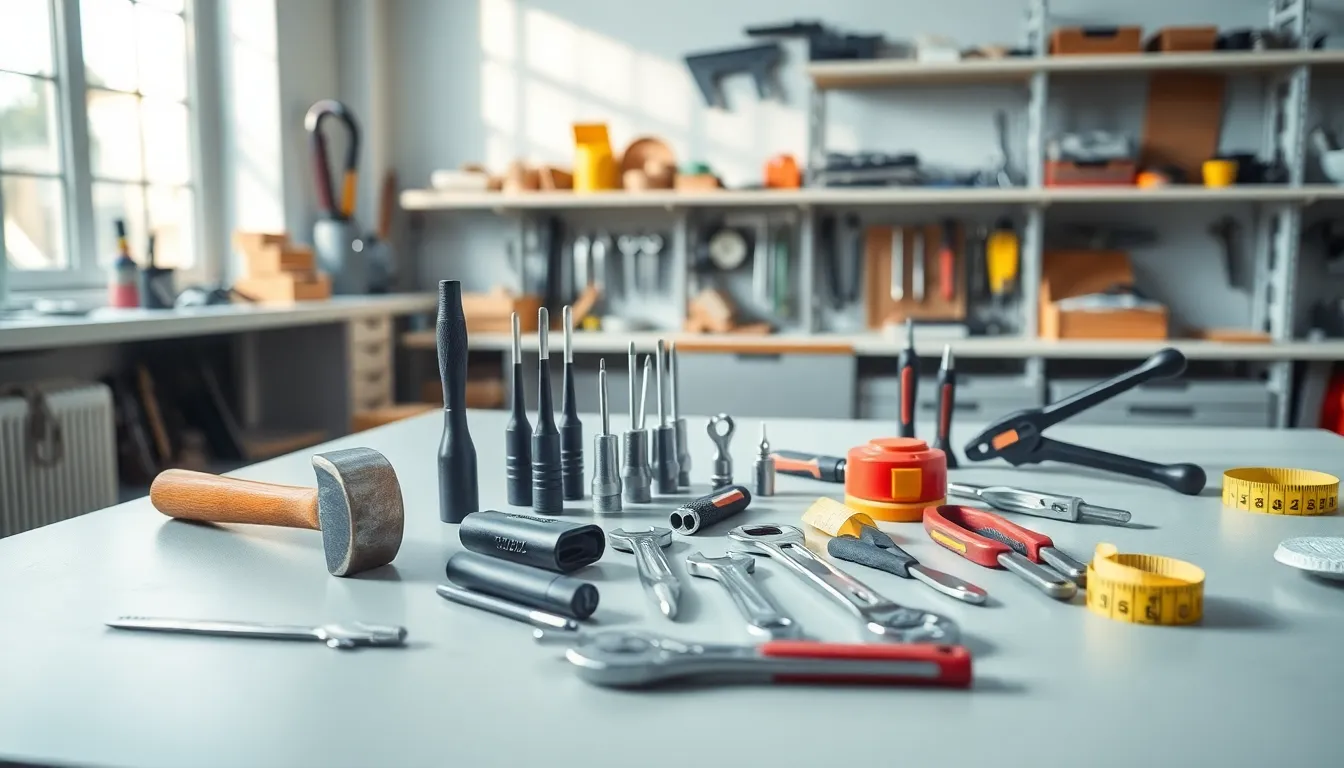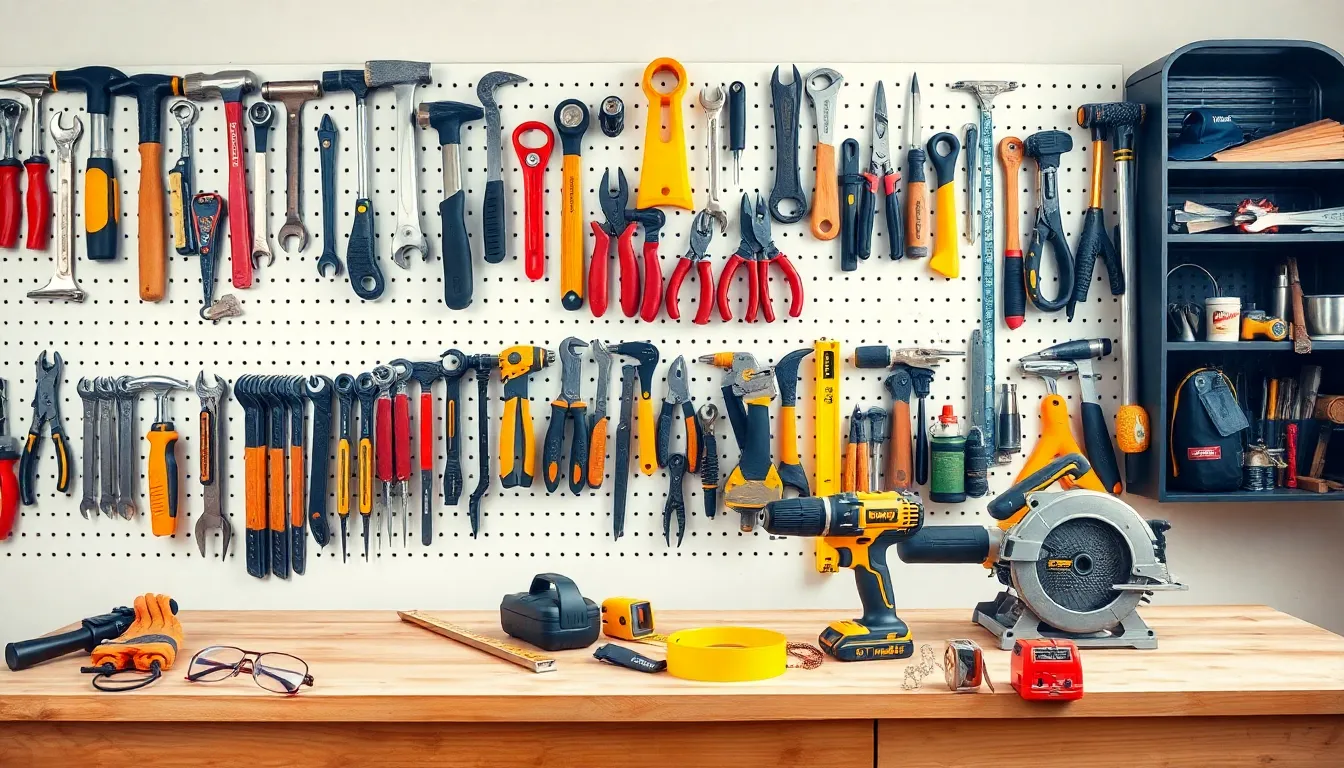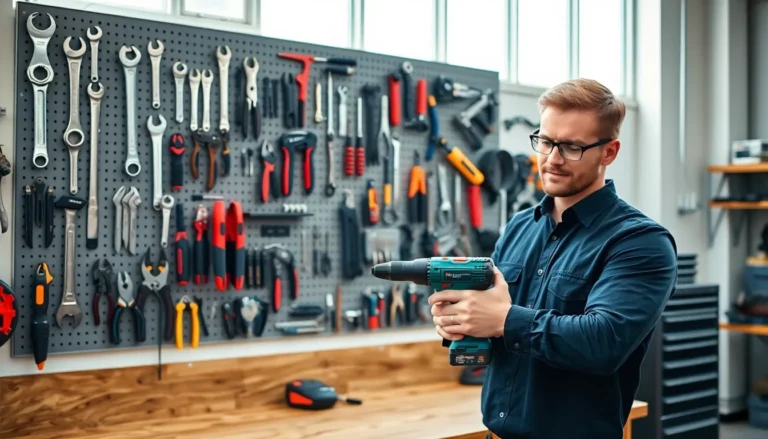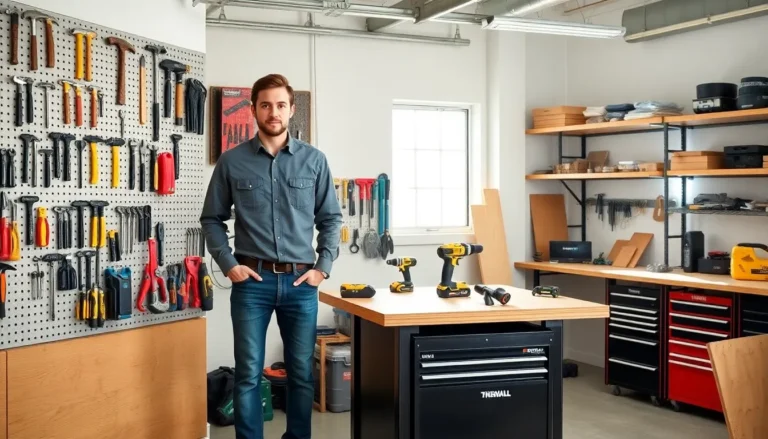If you’ve ever ventured into your garage and found yourself surrounded by a hodgepodge of tools that could rival a science experiment gone wrong, you’re not alone. Workshop organization is key, but so is knowing what tools you actually need, and it’s easier than you think. With the right workshop tools list, you’ll be ready to tackle any project, whether it’s fixing that leaky faucet or building your dream workbench. Let’s jump into the essentials because an organized workshop is a happy workshop.
Table of Contents
ToggleEssential Hand Tools

When it comes to hand tools, simplicity is often better than complexity. These trusty essentials should be the backbone of any workshop:
- Hammer: The classic tool for driving nails, pulling nails, and performing various other tasks with a satisfying thud.
- Screwdrivers: Invest in both Phillips and flathead types, ideally in a range of sizes. You just never know when you’ll need to tighten that stubborn kitchen cabinet.
- Wrenches: Adjustable wrenches and sets of socket wrenches provide versatility for different types of nuts and bolts. No one wants to spend hours hunting for the right size.
- Pliers: Needle-nose, slip-joint, and cutting pliers cover a wide range of scenarios, from gripping to cutting wire.
- Tape Measure: Always a crowd-pleaser, the tape measure is vital for ensuring your projects aren’t a millimeter off. Trust us: the difference between 8 inches and 8.1 inches can ruin your masterpiece.
These hand tools lay the groundwork for countless projects and are user-friendly enough for beginners and seasoned DIYers alike.
Power Tools for Efficiency
Once the hand tools are squared away, it’s time to amp things up with power tools. These machines can save both time and energy, making them valuable assets:
- Drill: Whether it’s corded or cordless, a good drill is crucial for everything from joining two pieces of wood to hanging shelves. Get a model with multiple speed settings for added versatility.
- Jigsaw: For intricate cuts and curves, the jigsaw reigns supreme. It’s a lifesaver when you’re looking to break the mold, literally.
- Circular Saw: This beast cuts through wood like butter, making it perfect for large sheets. Make sure to have the right blade for the material you’re cutting.
- Sander: If you want a smooth finish, an electric sander will save you hours of sanding by hand. Consider getting an orbital sander for a plush polish.
- Table Saw: Ideal for more significant projects, a table saw delivers precise cuts and can handle large materials with ease. Just remember to practice safety first.
Organization and Storage Solutions
A clutter-free workspace can work wonders for productivity. Here’s how to keep everything in its right place:
- Toolboxes: A spacious toolbox can hold all your hand tools in one neat, portable container. Opt for one with a variety of trays and compartments.
- Shelving Units: Install shelves to use vertical space. Storing tools and materials off the floor keeps your workspace open and manageable.
- Pegboards: These pegboards take organization to another level by allowing you to hang tools within easy reach. Plus, they add a touch of personality to your workspace.
- Storage Bins and Drawers: Clear bins are fantastic for smaller items like screws, nails, and bits. Label them for easy access and you’ll never scramble to find that elusive screw again.
- Magnetic Strips: Use magnetic strips to keep your frequently used tools visible and easy to grab. It’s a simple yet stylish solution to stay organized.
Safety Equipment and Gear
Safety should always take precedence in any workshop. Equip yourself with the following gear to ensure you can tackle projects without cutting corners:
- Safety Glasses: A non-negotiable in any workshop, these protect your eyes from flying debris. Choose a pair that fits comfortably over your regular glasses, if necessary.
- Ear Protection: Power tools can be loud. Invest in either earplugs or earmuffs to shield your hearing from noises that could be harmful over time.
- Dust Masks: Whether you’re sanding or drilling, a dust mask helps filter out fine particles, keeping your lungs happy and healthy.
- Gloves: Leather or cut-resistant gloves add a layer of protection for your hands. Choose a style that fits snugly but allows for dexterity.
- First Aid Kit: Just in case the unexpected happens, having a well-stocked first aid kit can help provide immediate care until you’re at the hospital or the doctor’s office.
Maintenance Tools and Supplies
Every good workshop needs a set of maintenance tools. These supplies help keep your equipment in tip-top shape:
- Lubricants: Whether it’s for a squeaking saw blade or sticky hinges, general-purpose lubricants can keep everything running smoothly.
- Cleaner: Keeping your tools clean extends their lifespan. A good cleaner specifically made for tools can spray away grime and gunk.
- Replacement Parts: Having a stash of replacement parts for your power tools, like saw blades and drill bits, will save you time. No one wants to run out mid-project.
- Batteries: Don’t forget an assortment of batteries for cordless tools. A dead tool does no one any favors.
- Multimeter: If any of your tools run on electricity, a multimeter can help troubleshoot problems.
Specialized Tools for Specific Projects
Depending on the projects at hand, specialized tools can make a world of difference. Here are some common ones:
- Router: This tool is ideal for shaping edges or hollowing out wood. It’s perfect for furniture-making enthusiasts.
- Miter Saw: A must-have for any woodworking project that requires precise angled cuts, especially for molding and trim work.
- Nail Gun: It speeds up framing and other projects dramatically. Forget hammering each nail in by hand and opt for the nail gun instead.
- Tile Cutter: For those DIY home improvement experts looking to re-tile a bathroom or kitchen, a quality tile cutter can make all the difference.
- Impact Driver: This tool excels when dealing with tougher screws, making assembly tasks faster and easier.
Budgeting for Your Tool Collection
Creating your dream workshop can be an expensive try. Here’s how to keep your finances in check:
- Set Priorities: Determine which tools you need most based on your projects. Focus on acquiring essentials first before splurging on specialized tools.
- Buy Used Tools: There’s nothing wrong with checking classifieds or garage sales for good-quality second-hand tools. Many times, these tools have plenty of life left.
- Sales and Discounts: Keep an eye out for seasonal sales at hardware stores. Stock up on items during these periods to save some cash.
- Tool Rentals: For tools needed infrequently, consider renting instead of buying. This can significantly reduce costs.
- Plan Monthly Investments: Rather than very costly at once, allocate a budget each month to gradually build your collection.



